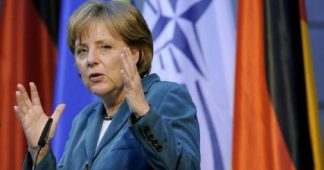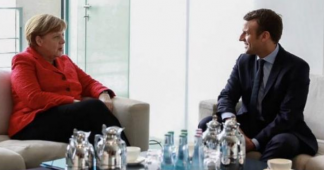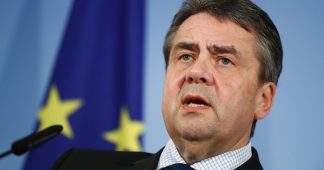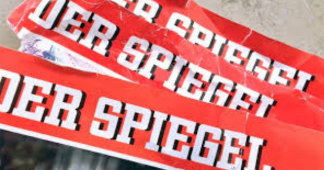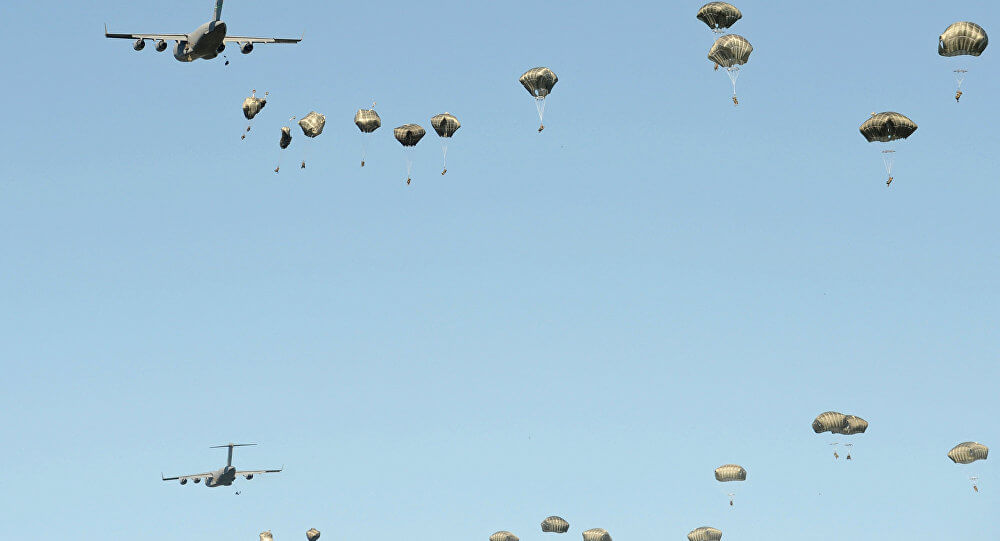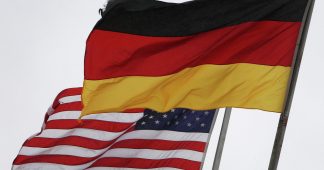By Johannes Stern
Since the Greens, led by Foreign Minister Joschka Fischer, organised the first foreign combat operation by German soldiers since World War II, joining the 1999 NATO war against Yugoslavia, the former pacifists have been a leading party of German militarism. This was underscored by an event titled “Foreign and European Policy Challenges for Germany” held last Wednesday at the German Society for Foreign Affairs (DGAP) in Berlin.
The Green Party’s lead candidate in this month’s national elections, Cem Özdemir, was invited to discuss foreign policy issues before the next German government with DGAP Deputy Director Christian Mölling and the foreign policy editor of Die Zeit, Jörg Lau. The discussion was moderated by Jana Puglierin, who heads the DGAP department on European foreign, security and defence policy and Germany’s role within Europe.
Özdemir made clear in his 20-minute introduction that the Greens have the same response to the profound crisis of capitalism and breakdown of the post-war order as the current federal government: a drive to build up the military at home and abroad, a renewed turn toward dictatorship and war, and the assertion of German claims to leadership in Europe and the world. His audience, including senior security policy experts, journalists, military personnel and representatives of the arms industry, responded with enthusiasm.
He declared that in times of “turmoil,” when “our values” are not only endangered by “self-serving dreams of a despot like Vladimir Putin or Recep Tayyip Erdogan,” but “also attacked by the president of the United States,” Europeans “are being challenged in a special way.” What is necessary, he said, is “a policy of value-guided realism in Germany and Europe.”
When Green politicians speak of defending “values,” one is obliged to envision fighter jets taking off for the next “humanitarian intervention.” The Green leader continued: “We need a foreign policy with soft power and hard power, with a clear framework of values, but also with the courage to deploy military means in those extreme emergencies where diplomatic methods reach their limits.”
Concretely, Özdemir called for military intervention in Syria and a harder line toward Russia. “Every time in Syria or somewhere else in the world humanitarian international law is broken without the international community responding clearly and firmly, international law loses its power to influence,” he declared. “It is therefore fatal if we dismiss a violation of international law with the claim: that was bad, but let’s leave them to fend for themselves.”
It is “also fatal when election campaigners from other parties demand a relaxation of sanctions on Russia or call for Putin to be brought back into the circle of the G8 without any shift on the question of Crimea, and when the ink on the Minsk agreement is not even dry.”
Özdemir’s concept of “value-guided realism” serves to further Germany’s claim to a leadership role in Europe. “It doesn’t make the European Union look good,” he said, “when we raise a warning finger at international partners, but in our own family circle fail to bang our fist on the table when necessary,” as when “a Viktor Orban attacks the basic principles of European mutual cooperation or a nationalist-minded government in Poland suspends the rule of law.”
Özdemir would, of course, bang his fist only where he saw German interests at risk. In Egypt, a close ally of German imperialism, he is prepared to support one of the most brutal military dictatorships in the world. Although Egyptian ruler al-Sisi is someone who suppresses human rights “with a firm hand,” he is also someone who “at least partially secures the division between state and religion for us and keeps the Islamists under control.”
The entire event was an exposure of the unscrupulousness and aggressiveness of the German elites 75 years after the end of World War II. In the panel discussion, Lau made the statement, “Sometimes I wake up in the morning with the desire that someone should do something outrageous against Erdogan. But after the second coffee, it passes.” Much of the audience snickered at this barely concealed call for another coup or even assassination of the Turkish president.
Mölling said of the major military build-up planned for the army, “But it could also end up being more expensive than 2 percent [of Germany’s gross domestic product]. Yes, we have to spend more. We can’t get anywhere the way things are now. Probably 3 billion extra will be needed every year to have an army that is to some degree functional. And there, Europe can and must help, otherwise it will be even more expensive.”
He went on to complain that Germany and Europe have “driven their defence capabilities to the wall” and are “only now beginning again to rebuild.”
Özdemir seconded the DGAP deputy director and noted, “The Greens also think that the army has to be properly equipped. We are also responsible for the security of the soldiers we send into international interventions, and it is necessary to ensure that they can do their job reasonably. That doesn’t happen free of charge, it has to be financed.”
Like Mölling, he appealed for a combat-ready European defence policy in alliance with France.
Even though the representatives of the German ruling class who sat on the panel have thus far been vehemently pro-American and supported US-led wars, the growing conflict with Washington was on display throughout the event.
Bernd Ulrich, deputy chief editor of Die Zeit, spoke from the audience and asked, “Is the American century perhaps over? At least, I would say that what is over is the United States’ moral-military leadership claim in light of the internal instability we now see. Has the claim to leadership not been forfeited?”
Lau warned that “the American government is effectively opposed to the things its partners consider right: multilateralism, retaining Europe.” While all of this has “no value to America, for us it is the principal value of foreign policy.”
The American government, he continued, has “decided that with Brexit, the beginning of the end of Europe is commencing. This was a sort of declaration of war. And this is only one reason for the shock we are all experiencing—that nothing can be taken for granted any more.”
Trump is “a freak,” he went on, but it is hard to tell “if he is the beginning of something where more terrible figures arise who are terrible in another way.”
Ten days before the federal election, the DGAP event underscored that there is no lack of “freaks” and “terrible figures” in Berlin, who are shaping the debates and preparing for war. As in the last century, Germany’s ruling class is responding to growing international tensions and the global struggle for markets and raw materials by rearming and striving to establish its domination over Europe so as to operate more effectively as a world power.
In a paper entitled “Foreign policy challenges for the next federal government,” the DGAP demands that the incoming government “decisively implement the comprehensive security policy approach introduced under the rubric of ‘New responsibility.’” This is a reference to the paper “New power, new responsibility,” which proclaimed the return of German militarism prior to the last federal election and included in the drafting process representatives of the Greens and the Left Party.
